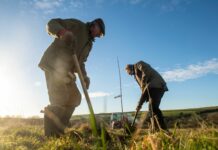Cornwall Council is calling on the Government to ensure that the UK continues to access Pan-European funding programmes that are open to non-member states, so that Cornwall’s businesses and communities continue to benefit from the skills, expertise and co-operation across a number of sectors and grow the local economy.
The Council says that continued access to funding will contribute to Cornwall’s post Brexit plan for the local economy and also help showcase Cornwall’s skills base and expertise to new contacts in other regions, leading to fresh opportunities.
Supporting more than 50 projects since 2000, the funds have brought over £7 million into the economy of Cornwall. The lasting social and economic impact of these activities, says the Council, is significant.
Among the many groups who have already benefitted are:
- A network of 200 female entrepreneurs, on each side of the Channel, supported to develop their skills, start their own business and begin exporting.
- Cross Channel Film Labs, who have developed links between screenwriting, visual effects and 3D innovators in Cornwall and Finistère, in a bid to produce a new generation of ambitious and technically innovative film projects; and
- More than 16,000 young people, who have taken part in exchange vocational work experiences and received marine careers advice across a number of EU countries.
Following the UK’s exit from the European Union, the opportunity to continue participating in cooperation programmes with EU partners can be agreed as part of the UK’s Brexit deal.
These programmes are open to non-member states, and there are different ways to participate. For example, Norway currently contributes to the INTERREG programme, allowing Norwegian organisations to take part in joint projects. At a meeting of interested regions and stakeholders from the UK and France, Cornwall Council called on the UK Government to work to make this part of the deal.
The Council also cited maintaining the unique partnership with the Conseil Departemental du Finistère which has been built up over almost 30 years to share experience and expertise and build a deep cultural understanding between the two regions as crucial to Cornwall’s post-Brexit plans.
Cllr Bob Egerton, economy and planning portfolio holder, said: “Cornwall is open for business. We are an outward looking region and are proud of our longstanding partnerships across the channel. For almost 30 years, we have worked successfully with Finistère. We look to the UK Government to enable regional cooperation that is vital for the prosperity of regions like Cornwall and Finistère.”
Paul Wickes MBE, CEO of Cornwall Marine Network said: “Transnational cooperation programmes have proven to be very valuable to businesses and young people in the marine sector. Since 2005, CMN has worked in partnership collaboration with eight marine organisations in Brittany (as well as 66 across the EU) to jointly engage more than 16,000 young people in exchange vocational work experiences and marine careers advice.
“Additionally, marine engineering apprentices from Cornwall have gained technical and cultural added-value during work placements with marine businesses in Finistere, and we have recently researched and identified the emerging skills needs of the offshore renewable energy sector.
“Currently CMN is supporting the capacity building of a Finistere agency to engage SMEs in Apprenticeships, many for the first time.
“Working together we have better prepared young people for marine careers, created new jobs and apprenticeships, so access to transnational programmes post Brexit (particularly, Interreg, Erasmus, H2020 and CoSME) is key to building on the excellent success we have shared so far.”








